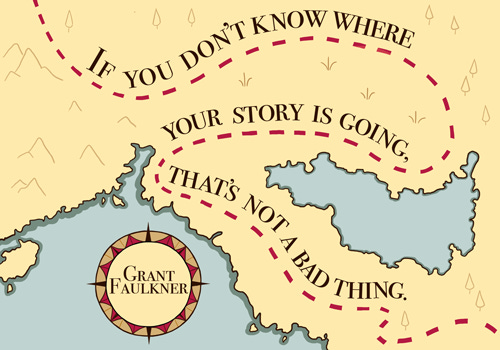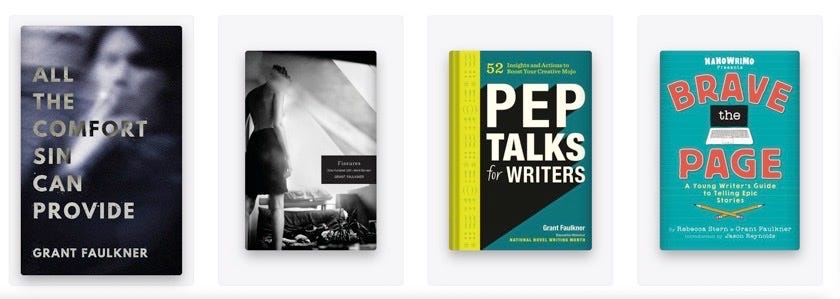I was recently asked whether it’s more difficult to write the beginning or the ending of a novel. My answer? Neither. The most difficult part of a novel to write is the middle—popularly known as the “muddy middle,” or just the “muddle.”
When you’re writing the beginning of your novel, your words tend to flow to the glowing enchantment of your novel idea—a momentum sparked by the excitement of pursuing a shiny new idea and exploring new worlds. Then, one day, you’re likely to hit a slow patch, and then another slow patch, and then … you might find yourself stuck—and perhaps even sinking.
Part of what creates the mud of the muddy middle is self-doubt. It’s easy to not only question your novel idea, but to question yourself as a writer (and perhaps even as a human being). Remember this: Every writer hits patches like this—even your favorite writer—so you’re not alone.
When your words enter such swampy territory, it’s easy to concede victory to those naysaying voices in your head pulling you ever deeper into these perilous moors. And sometimes defeat can seem strangely comforting. It’s easy to drop onto those fluffy pillows of complacency where you expect little of yourself, and perhaps little of life.
You can watch TV shows and play video games for a lifetime and never run out of entertainment, right? But giving up is never as easy as it initially seems. That empty page is like a ghost that will follow you the rest of your life. Your story won’t stop calling you.
Every novel requires a simple four-letter word that is as important as imagination itself and is its own kind of enchantment: grit. Grit is that extra something that separates the most successful people from the rest. In fact, research has shown that grit is even more important for success than intelligence or talent.
As Martin Amis said, “Novelists are stamina merchants, grinders, nine-to-fivers.”
Grit is more than just persistence. It’s a persistence that’s fortified with passion, optimism, and hope—a combination that coalesces into a steely and unwavering purpose that keeps us moving with a consistent effort toward our goal even when we struggle, falter, or outright fail. Grit equips us with a shield that deflects nettlesome naysayers and our own damning doubts. It’s an energy drink, a pep talk, a sprinkle of fairy dust, and a compass all in one.
Sometimes, though, you need more than the muscular, determined energy of grit. You need a trick or two to juice your grit. Try these three things:
No. 1: Let go to hold on
One of the laws of quicksand is that the more you struggle to get out of it, the more trapped you become. Escaping quicksand is actually quite easy, though. Your body is less dense than the sand, so all you have to do is relax, and you’ll float to the surface.
The same principle applies to getting through the bogs of your novel. Your impulse might be to panic and thrash about, but the more frantically you try to lunge forward, the more likely you’ll be to sink. If you relax, though, you can float back up to the surface of your story and catch another gust of wind.
Don’t write what you know, write what you want to know.
So turn off your computer for a spell, and do whatever it takes to feel a sense of lightness. If you don’t know where your story is going, that’s not a bad thing. View the blank page as an invitation to drop a bucket into the well of your imagination.
Don’t write what you know, write what you want to know. Begin with a detail, a mood. Keep expanding. Keep trying different angles. Find a sentence that surprises you. Switch points of view. Just for the sake of it. Just to experiment. Remember, your mind is acrobatic. Your imagination can take you anywhere.
No. 2: Try “skipnoveling”
Films aren’t made chronologically, and there’s no rule that a novel has to be written in a linear fashion either. If you’re having trouble with the muddle of that devilish Chapter 7, then give yourself permission to skip it altogether. Move on and just try to reach the end of your novel. Sometimes it takes a while to solve the bedeviling questions of a novel—sometimes it even takes several drafts. So just sketch some notes in Chapter 7 and move on.
No. 3: Trust in a word prompt and a writing sprint
When in doubt, turn to a writing prompt and do a word sprint. I once planned an entire novel by choosing one writing prompt for each chapter. You can do a sprint with a prompt in several different ways during NaNoWriMo:
Check out @NaNoWordSprints on Twitter;
Go to a NaNoWriMo write-in in your local region;
Give yourself a prompt.
Once you escape the quicksand, writing one sentence will lead you to another sentence, and you’ll soon see the finish line on the horizon beckoning you. You’ll know that you can keep going by simply putting one word in front of another, and you’ll sense this great gift waiting for you. The gift of your novel. The gift of your journey. The gift of your accomplishment.
Plus, you’ll know how to deal with quicksand the next time you step into it—in writing and in life.
Because quotes will help you get through the mud
“Each day make a mini-plan of what you want to get accomplished. A big task is just a series of small tasks. A book is just a series of chapters. Daily goals are my bread and butter.”
—Dhonielle Clayton
“I like to think of NaNo-ing as excavating … Things that felt like desperate, random nonsense on page 72 (the broken pocket watch, a partially obscured tattoo, that taxidermied marmot on the mantelpiece) are suddenly important and meaningful on page 187. Everything could hinge on the fate of that marmot. Or the marmot may be a red herring. Or perhaps the marmot is just a marmot. You have to keep writing to find out.”
—Erin Morgenstern
“The single most important technique for making progress is to write ten words. I think of this as baiting a hook. I find that as long as you have to think about the novel enough to write ten words, the chances are that more will come.”
—Naomi Novik
Because NaNoWriMo homework
Planning is one way to touch hope when you’re feeling hopeless. It’s one way to refuel.
Pause from writing, and make a creative plan for the week. Then do what Dhonielle Clayton advises above: make a mini-plan for the day.
Because my novel writing series
Each week until the end of National Novel Writing Month this November, I’m writing about a different creativity topic related to NaNoWriMo. If you’re not doing NaNoWriMo, don’t worry: all of the topics should relate to any creative project.
Here are the previous pieces in the series:
Because I’d love you to read one of my books
I write this newsletter for many reasons, but mainly just for the joy of being read and having conversations with readers. This newsletter is free, and I want it to always be free, so the best way to support my work is to buy my books or hire me to speak.
Because more about me
I am the executive director of National Novel Writing Month, the co-founder of 100 Word Story, and an Executive Producer of the upcoming TV show America’s Next Great Author. I am the author of a bunch of books and the co-host of the podcast Write-minded.
My essays on creative writing have appeared in The New York Times, Poets & Writers, Lit Hub, Writer’s Digest, and The Writer.
For more, go to grantfaulkner.com, or follow me on Twitter or Instagram.








PS I'm sincere--I realize the tone of my comment might come off as sarcastic--but no, I really like that strategy. I write memoir and I think it works for a smaller stand-alone piece as well as a larger work. So, thank you for that tip.
Great strategy: skip to another section if you're stuck. Thanks.